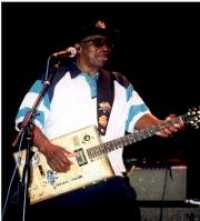Ever heard "I Want Candy" or "Not Fade Away" or "Willie & The Hand Jive", Shirley & Company's "Shame, Shame, Shame" or U2's "Desire" or George Michael's "Faith"? If you have, then you've heard the "Bo Diddley beat"; the most famous beat in the world! One of the founding fathers of rock 'n' roll, Bo Diddley's innovative pounding and hypnotic, Latin-tinged beat, his vast array of electric custom-built guitars, his use of reverb, tremelo and distortion to make his guitars talk, mumble and roar, his use of female musicians, his wild stage shows, and his on-record and on-stage rapping, pre-date all others.
Bo Diddley was born Ellas Bates on Sunday December 30th 1928 on a small farm near the town of McComb, Mississippi, USA, in rural Pike County, close to the Louisiana border, the only child of Ethel Wilson and Eugene Bates. He had 3 half-brothers and a half-sister.
He was adopted by his mother's cousin, Mrs. Gussie McDaniel, along with his cousins Willis, Lucille and Freddie, and adopted the name Ellas McDaniel. In the mid-1930's the family moved to the south side of Chicago. Soon after, he began to take violin lessons from Professor O.W. Frederick at the Ebenezer Missionary Baptist Church. He studied the violin for twelve years, composing 2 concertos for the instrument.
For Christmas in 1940, his sister Lucille bought him his first guitar, a cheap Harmony acoustic. It was at this time that he acquired the nickname "Bo Diddley" ("...Bo Diddley is me; to tell ya the truth, I don't know what it (the name) really is...") from his fellow pupils at the Foster Vocational High School in Chicago.
The newly-named Bo Diddley had long been fascinated by the rhythms that he heard coming from the sanctified churches. A frustrated drummer, he tried to translate the sounds that he heard into his own style. Gradually he began to duplicate what he did with his violin bow by rapidly flicking his pick across his guitar strings. "I play the guitar as if I'm playing the drums....I play drum licks on the guitar." He continued to practice the guitar through his early teens.Shortly before leaving school he formed his first group, a trio named The Hipsters, later known as The Langley Avenue Jive Cats, after the Chicago street where he lived. Upon graduation he pursued a variety of low paid occupations including truck driving, building site work and boxing, playing locally with his group to supplement his income. Around this time he married his first wife Louise Woolingham, but the marriage did not survive. A year later he married Ethel "Tootsie" Smith, a marriage that lasted just over a decade. In 1950 maracas player Jerome Green joined the group, followed a year later by harmonica player Billy Boy Arnold.
After more than a decade of playing on street corners and in clubs around Chicago, Bo Diddley finally got the chance to cut a demo of 2 songs that he had written; "Uncle John" and "I'm A Man". After various rejections from local record labels, (most notably Vee-Jay), in the spring of 1955 he took the recordings to brothers Leonard and Phil Chess, owners of Chess Records, with studios located at 4750-2 South Cottage Grove Avenue in Chicago. They suggested that he changed the title and the lyrics of "Uncle John" to more reflect his own unique personality.
The 2 songs were re-recorded at Bill Putnam's Universal Recording Studio at 111 East Ontario in Chicago on Wednesday March 2nd 1955, and released as a double A-side disc "Bo Diddley"/"I'm A Man" on the Chess Records subsidiary label Checker Records. It went straight to the top of the rhythm 'n' blues charts, establishing Bo Diddley as one of the most exciting and original new talents in American music.
With musical influences of his own ranging from Louis Jordan to John Lee Hooker, and from Nat "King" Cole to Muddy Waters, Bo Diddley was now set to help shape and define the sound and presentation of rock music for all time. From Elvis Presley to George Thorogood, from The Rolling Stones to ZZ Top, from The Doors to The Clash, from Buddy Holly to Prince, and from The Everly Brothers to Run DMC, all acknowledged the unique influences of Bo Diddley upon their styles of music.
Now in his early 70s, he is still very much active in the recording studio and in the clubs and the concert halls around the world. He performed a rousing version of his classic song "Who Do You Love" with George Thorogood & The Destroyers in front of a TV audience of millions at the Live Aid Concert in Philadelphia in 1985. A couple of years later he was deservedly an early inductee into the Rock 'n' Roll Hall of Fame. In 1996 he received a Lifetime Achievement Award from the Rhythm 'n' Blues Foundation and in 1998 received another Lifetime Achievement Award this time from The Recording Academy at that year's annual Grammy Awards Ceremony. In 2000 yet another honour was justifiably awarded to him when he was inducted into The Mississippi Musicians Hall of Fame.
In the words of one of his many famous eponymous songs, "Bo Diddley Put The Rock in Rock 'n' Roll", and remember..... Bo Knows!
David Blakey, Webmaster, BO DIDDLEY-The Originator http://members.tripod.com/~Originator_2/index.html A Celebration of Bo Diddley's unique contribution to Popular Music.
